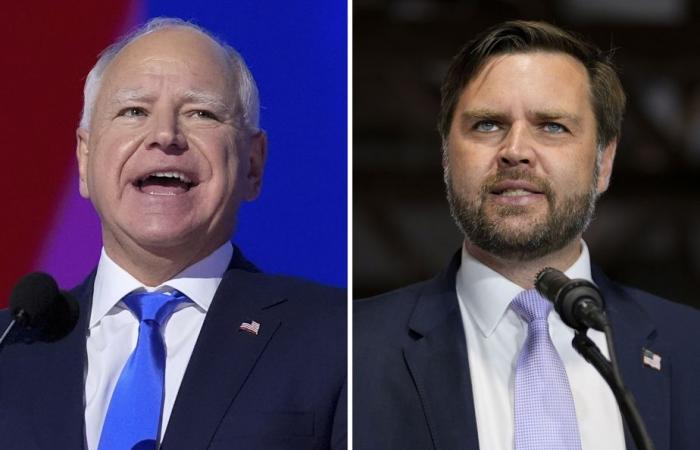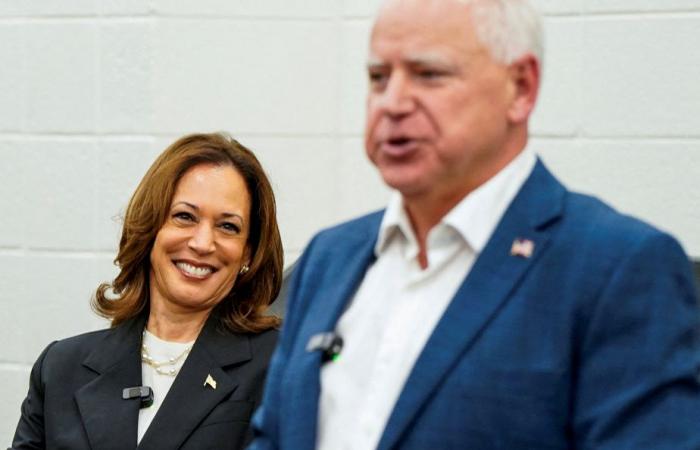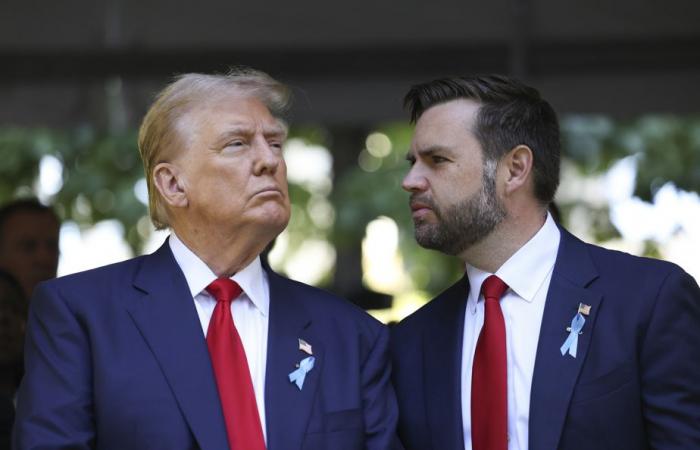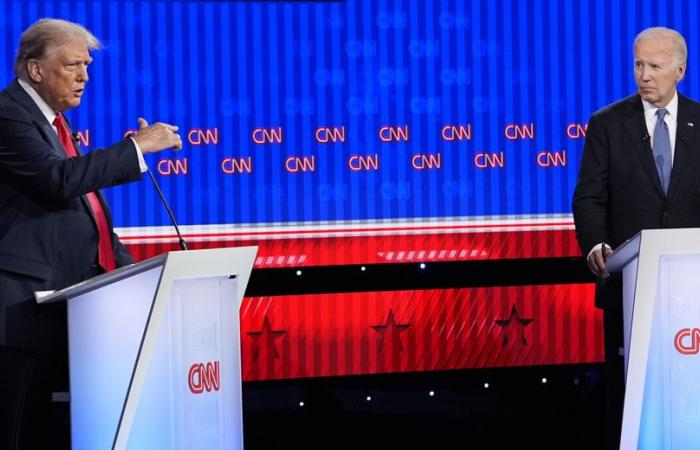(Washington) Tim Walz and JD Vance are expected to face off on Tuesday in the only debate between the vice-presidential candidates ahead of the US election in November.
Posted at 7:16 p.m.
Kelly Geraldine Malone
The Canadian Press
MM. Walz, the Democratic governor of Minnesota, and Vance, the Republican senator of Ohio, are both likely to be on the offensive.
Todd Graham, a debate professor at Southern Illinois University, says Mr. Walz had one main task: keep saying his opponent is “too weird for the White House.”
According to him, Mr. Vance will above all try to demonstrate that he is not weird and that he can be trusted.
That may seem like an odd prediction for the subject of a vice-presidential debate, but Mr. Walz has made a name for himself by calling rival Republicans weird.
It is now the most successful attack for Democrats, after a tumultuous summer that began with a disastrous debate between Donald Trump and Joe Biden and the president’s withdrawal from the race.
It was also one of the factors that led Vice President Kamala Harris to nominate Mr. Walz to be at her side.
PHOTO ELIZABETH FRANTZ, ARCHIVES REUTERS
Kamala Harris et Tim Walz
Two candidates, two approaches
The attack particularly targeted Mr. Vance for his comments on abortion, “childless cat ladies” and his previous suggestions that political leaders who do not have biological children have no concrete reasons attaching them to the good of the country.
Memes and videos played up those remarks, as well as interactions Mr. Vance had with voters, including a viral encounter at a donut shop.
The candidate nevertheless showed that he could circumvent criticism and did not hesitate to make other controversial comments.
He maintained an unverified claim that Haitian immigrants to Ohio ate pets. Donald Trump even repeated them during the presidential debate earlier this month.

PHOTO YUKI IWAMURA, ARCHIVES ASSOCIATED PRESS
Donald Trump and JD Vance
Ohio city officials have said there is no evidence that this is true, but JD Vance said on CNN on September 15 that he had heard firsthand accounts from his voters and accused the media of ignoring immigration issues.
“If I have to create stories so that the American media will actually pay attention to the suffering of the American people, then that’s what I’m going to do,” Vance argued at the time.
He could still prove to be a fierce opponent for Mr. Walz, said Aaron Kall, the director of debate at the University of Michigan.
JD Vance, 40, rose to prominence with the 2016 publication of his memoir, Hillbilly Elegy. A former critic of Donald Trump, he was elected to the US Senate in 2022 after becoming one of the former president’s staunchest defenders.
He was chosen to connect with white, working-class voters, who play an important role in Mr. Trump’s chances in Wisconsin, Pennsylvania and Michigan.
These states swung to the Republican side when Mr. Trump won in 2016. In 2020, they instead helped bring Joe Biden to the White House.
Democrats are hoping that 60-year-old Tim Walz’s “good guy from Minnesota” attitude, football coaching background and outspokenness will resonate with those same crucial voters.
Mr. Graham believes that both will have three tasks in the debate: defend their presidential candidate, attack the other’s candidate and prove that they are capable of being the president that had to happen.
While Donald Trump won the June debate against Mr Biden, political experts said Mrme Harris winning when the two faced off.

PHOTO GERALD HERBERT, ARCHIVES ASSOCIATED PRESS
Donald Trump and Joe Biden during the debate organized by CNN, June 27, 2024, in Atlanta.
She taunted Mr. Trump about the size of the crowds at his rallies and the 2020 defeat, inciting him into tirades that distracted him from his debate goals, immigration and the economy.
Mr. Vance is unlikely to fall into the same trap.
“No matter what Walz tries to say, he won’t fall for it. He will stick to the problems,” predicts Mr. Kall.
A protectionist policy on both sides
Both vice presidential picks have a Canadian connection. Mr. Walz’s state shares an 885-kilometer border with Ontario and Manitoba. Not long ago, he played football with Ontario Premier Doug Ford.
For his part, Mr. Vance went to university with Jamil Jivani, the Conservative MP for Durham. Mr. Jivani called Vance his best friend at Yale and read a passage from the Bible at the American politician’s wedding.
Both parties have introduced policies that experts have called protectionist. Donald Trump has repeated his plan to impose 10% tariffs on imports and Mr Vance is a vocal opponent of US military aid to Ukraine to repel the Russian invasion.
Last week, Mme Harris recalled that she was one of 10 U.S. senators who voted against the Canada-U.S.-Mexico agreement under the Trump administration, saying it was not enough to protect American workers. If she becomes president, Mme Harris said she will push for the trade deal to be revised in 2026.
Matthew Lebo, an expert on U.S. politics at Western University in London, Ont., said Canadians watching Tuesday’s debate probably won’t glean many details about those trade policies. MM. Walz and Vance will speak on personal economic issues and inflation to connect with American voters.
In such a close election, the vice president can play on the popularity of the presidential candidate, says Mr. Lebo.









